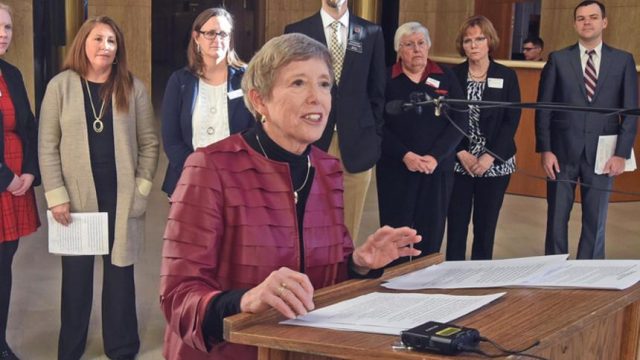Michael Hamilton: Time for North Dakota to End Dental Therapy Prohibition

TOM STROMME/Tribune Sen. Judy Lee (R-West Fargo) speaks of the benefits of good dental access and in support of HB 1256, a bill dealing with the issue at a press conference in Memorial Hall of the state capitol in Bismarck on Wednesday afternoon. Bill supporters in back from left are Jenna Herman, Christy Jo Fogarty, of the Minnesota Childrens Dental Services, Renee Stromme, Rep. Christopher Olson (R-West Fargo), Dianne Billey, Connie Kalanek and Michael Hamilton.
There was standing room only by 8:40 a.m. in a North Dakota House Human Services Committee hearing that started on January 18 at 9:00 a.m. and ran past noon, more than 90 minutes overschedule, as experts made their cases for and against a bill to allow midlevel providers called dental therapists to practice in the state.
I know because I was there.
Authorizing dental therapy in North Dakota would expand oral care access for underserved patients, primarily by increasing the liberty of dentists to build their dental dream teams. That’s the message I was privileged to tell lawmakers in my testimony ahead of their upcoming votes, most likely to occur in committee on Monday, January 22, and (one hopes) from the House floor later next week.
Proponents presented rational, evidence-based arguments explaining that House Bill 1256, sponsored by Rep. Bill Devlin (R-Finley), would create another hiring option for dentists currently lacking an incentive to expand their practices. Introducing dental therapists into the labor market would change some dentists’ calculus. Dental therapists are trained to perform up to 94 services and procedures, compared to fewer than 40 learned by dental hygienists and about 30 by dental assistants. Dental therapists would practice exclusively under the supervising dentists who employ them, delivering high-quality care at lower wages than licensed dentists would earn.
[mks_pullquote align=”right” width=”300″ size=”24″ bg_color=”#ffffff” txt_color=”#000000″]Dental therapists would practice exclusively under the supervising dentists who employ them, delivering high-quality care at lower wages than licensed dentists would earn.[/mks_pullquote]
Proponents accurately anticipated and defused arguments presented by opposition in the second half of the hearing and published beforehand. These included objections dental therapy is unsafe, gives Medicaid patients the shaft, fails to increase rural access, takes other options off the table, doesn’t appeal to dentists, and is a harbinger of socialism.
My rebuttal to these cavity-riddled objections to dental therapy is available at Heartland.org. I drew most of them from “The Case for Licensing Dental Therapy in North Dakota,” a new Heartland Institute Policy Brief written by former North Dakota representative Bette Grande, Texas Public Policy Institute Senior Fellow John Davidson, and me. I gave each committee member a copy of the 20-page brief, along with a 1-page Policy Tips sheet.
The difficulty of opponents’ task was evinced by several apparently accidental concessions that dental therapy would help dentists expand access for underserved patients. These Freudian slips cropped up amid the belabored argument that letting dentists hire therapists would somehow prevent dentists from pursuing alternative solutions to North Dakota’s oral care shortage. The truth is dental therapy would increase, not diminish, the number of available solutions.
Another favorite argument against dental therapy is that because some, or even most, dentists would not hire a dental therapist right now if given the chance, no dentist should have this option. A more brazen assault on individual choice, not to mention dentists’ professional judgment, were never writ. As I told the committee:
“A rising refrain among opponents is: ‘Dentists in North Dakota don’t want to hire dental therapists, so there is no point in licensing them.’ On the contrary, if dentists won’t hire therapists, there is no point in blocking their licensure. That opponents finally acknowledge the vital role dentist choice would play in the spread of dental therapy in North Dakota comes as a welcome relief.”
Testimony by Shawnda Schroeder may have done more than anyone to cut through the plague blocking dental therapists from cleaning up North Dakota’s oral care shortage. Schroeder has authored several Fact Sheets at the Center for Rural Health at the University of North Dakota’s School of Medicine & Health Sciences. The Bismarck Tribune summed up her neutral testimony in an article published on January 19:
“The [C]enter sent a survey to all of the licensed dentists in the state, she said, and about 28 percent have responded. Preliminary data from the survey showed about 16 percent of the 114 who responded would definitely participate in the practice of dental therapy, or would participate depending on specifics of the program.
“Rural dentists were more likely than urban dentists to indicate willingness to participate, Schroeder said. Twenty-four percent of rural dentists who responded said they would participate, or would participate depending on the details, compared with 11 percent of urban dentists who have responded so far. Final results of the survey should be available soon, she said.”
In other words, there is already market for dental therapists in North Dakota, despite a blockade of the profession by opponents using the law to lock down the status quo.
It’s time for North Dakota lawmakers to end dental therapy prohibition.




